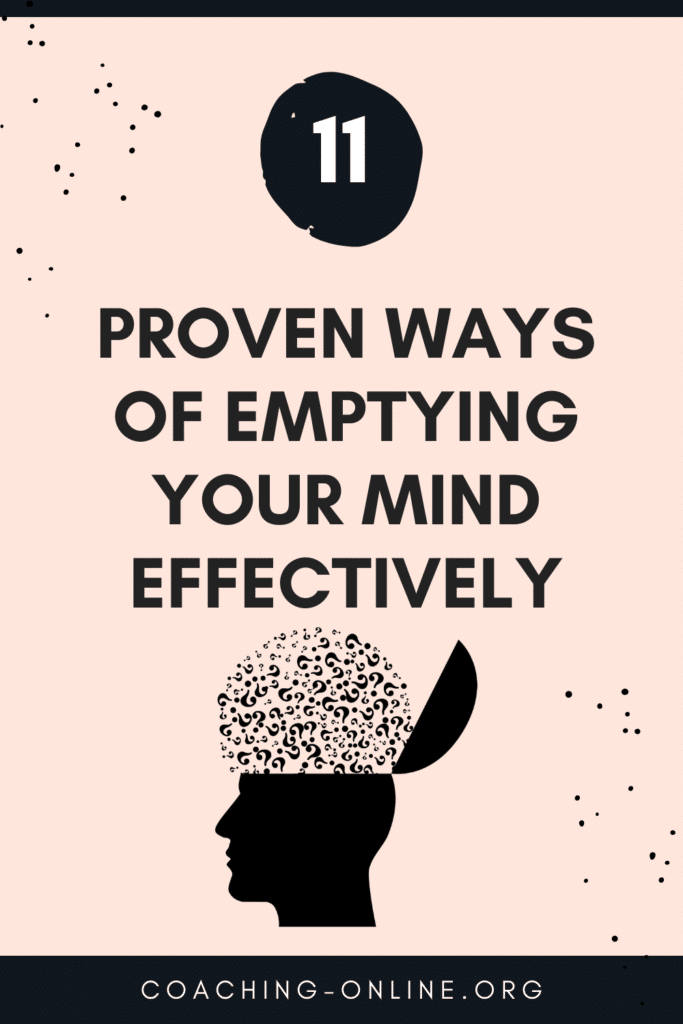Have you been feeling stressed and overwhelmed? Your mind can’t stop running. Every second you’re bombarded with thoughts that don’t seem to go away.
You feel overwhelmed.
Today we change that.
In today’s article, we’ll explore 11 proven strategies you can use to effectively empty your mind and remain focused as you work on your goals.
Here’s what you’ll learn.
Let’s get right into it.
What Does Emptying Mind Mean?
Most people believe that the mind should always be working. How else are you supposed to come up with ideas, think, or plan for the future?
However, that’s not true.
Just like your body, your mind needs rest from the constant stream of thoughts. You need to take time to empty your mind.
However, what does it mean to empty your mind?
According to the Macmillan Dictionary, emptying your mind means purposefully trying to avoid thinking about anything.
To empty your mind, you need to work towards stopping the constant stream of thoughts running through your mind every second. Although you may not get rid of all your thoughts, emptying your mind allows you to focus on fewer ideas at a time.
“But how will emptying my mind help me?”
Keep reading to learn more.
Positive Effects of Emptying your Mind
Obsessing over the same thought over and over, also known as rumination, can be harmful. It often leads to anxiety, which triggers stress, therefore, robbing you of the chance to enjoy the present moment.
Long-term rumination may also result in physical, mental, and emotional issues.
Which is why you need to clear your mind of all stressful thoughts.
Emptying your brain allows you to achieve an improved state of mind, which in turn leads to
- Better relaxation
- More awareness
- Improved intuition
- Decreased cortisol levels
- Improved creativity
- Improved mental health
Now that you know how emptying your mind is likely to benefit you, let’s get into strategies you can use to empty your mind.

How to Empty your Mind
#1. Meditation
One of the most effective and well-known ways to clear your mind is through regular meditation.
With meditation, you’re able to remove yourself from every negative thought and focus on your breath or positive thinking. Through meditation, you’re able to think more clearly, which reduces the possibility of future stress.
And don’t just take my word for it.
Countless studies have repeatedly proved that meditation helps reduce anxiety and stress while improving attention.
And that’s not all!
Researchers have also linked meditation to have a substantial effect on how people experience pain. According to studies, meditation results in decreased activity in areas of the brain associated with pain and anxiety. Thanks to this effect, people who practice meditation are less likely to focus on thoughts that cause them pain.
If you want to improve your ability to empty your mind, create a daily practice where you meditate for 20 minutes in the morning and 20 minutes before bed.
However, with meditation, it’s important to note that it takes time. Your mind won’t clear in your first, second, or third attempt. On your first attempt, you may have more distracting thoughts that you expected.
Don’t give up.
Like going to the gym, meditation is a practice that you need to do consistently to experience the positive effects.
Wondering how to meditate?
This video by Marissa Peers is an excellent place to start.
#2. Read a Fictional Book
Picking up a book is another excellent way to clear your mind on stressful days. This is because books provide you with an escape without really getting away.
Through reading, you immerse yourself in a different world, which allows you an effective escape from your current stressors.
However, don’t just read any book.
When looking for an escape, go for fictional books. They are fun to read and allow the brain to relax and disengage from your current reality. With fictional texts, you don’t have to worry about analyzing the information given.
Although non-fictional books are great for giving instructions on different issues, they aren’t the best choice for anyone looking to empty their mind. With non-fiction books, your brain doesn’t relax but instead becomes alert to receive critical information.
Related: 120+ Best Quotes For Overthinkers
#3. Practice Mindfulness
When trying to empty your mind, it’s essential to remember that you can’t force your brain to stop thinking.
“But if I can’t stop the chatter in my brain, how will I empty my mind?”
Short answer? Mindfulness.
Mindfulness is the act of consciously focusing on what you’re feeling at the moment without any judgment or interpretation.
Unlike traditional meditation, mindfulness doesn’t entail stopping all activities. All you need to do with mindfulness is slow down and pay attention to how your brain is doing and how your body feels. You can practice mindfulness while going about your daily activities.
When you work on a task with mindfulness, you allow your brain to redirect attention from stressful thoughts and focus on the job at hand.
And don’t just take my word for it.
A Brown University study found that mindfulness training allows people to be able to switch focus from negative thoughts to more positive thoughts.
Related: Is Talking To Yourself Bad? 16 Scientific Reasons Why It Isn’t
#4. Practice Living in the Moment/ Practice Breathing Techniques
Do you often catch yourself daydreaming when you’re supposed to be focusing on a specific task?
You’re not alone.
Harvard psychologists found that most people think of something else while working on a different task. Thanks to constant mind wandering, most of the study participants reported experiencing more unhappiness than those who entirely focused on the task at hand.
So, if you’re looking to clear your mind, train your mind to focus on the present moment.
One of the most effective ways to do this is by taking small breaks and focusing on your breathing. This could be hourly, where you take between 1-3 minutes and focus solely on your breathing.
If the constant stream of thoughts keeps you from sleeping, you can use breathing techniques to help empty your mind. One of the most effective techniques entails breathing in for four seconds, then breathing out through your mouth for four or more seconds.
By taking this approach, you train your brain to relax during stressful or overwhelming situations.

#5. Write in a Journal
Writing out your thoughts and emotions is one of the best mind emptying activities.
By writing, you’re able to organize your thoughts, observe them, and gain some perspective on what’s stressing you.
Writing out your thoughts allows you to take them out of your head and put them on paper; therefore, clearing space in your mind.
Journaling also helps you to express stressful thoughts without the fear of being judged.
Writing down what’s stressing you also helps you develop a solution to your stressors—no need to rely on people to help you sort out your issues.
With a journal, you can do it all on yourself.
“But how do I journal?”
If you’re new to journaling, you can start by asking yourself the following questions.
- What am I doing?
- How am I feeling?
- How will I deal with what I’m feeling?
Using these three questions, you’ll get a better insight into what’s going on in your head; and, in turn, empty your mind.
#6. Talk to a Friend
Another effective way to clear your mind is by talking to a friend. Discussing your problems and possible solutions with a friend has been reported to reduce stress significantly.
By simply talking, you’re able to gain a clearer perspective and in most instances, realize that things aren’t as bad as you may have initially thought.
Talking to a friend also offers a fun and healthy distraction.
And that’s not all!
Knowing that you have someone you can talk to when things aren’t going gives you a confidence boost when you encounter challenging situations.
When talking to friends, it’s easy to start ruminating.
Constantly revisiting your problems with different friends may increase negative feelings, which translate to anxiety and depression.
The trick lies in knowing how to balance healthy conversations and ruminating.
#7. Exercise
When was the last time you went out for a run or went to the gym? If you can’t remember the last time you exercised, this could be why you’re always stressed.
This is because regular exercise has a positive effect on stress.
Sound counter-intuitive, right?
Exercise results in physical stress. How then does it help with mental stress?
According to researchers, exercise helps to reduce the level of stress hormones, including cortisol. Exercise also results in increased production of feel-good hormones such as endorphins.
And that’s not all!
Exercise also allows you to focus on something else other than your stressors. If you choose to run, you’ll focus more on reaching your destination. If you’re doing weight training, you’ll focus on being able to perform each repetition correctly.
#8. Spend Time in Nature
How often do you unplug from technology and take a walk in the park?
If you’re like most, it’s close to never.
However, studies have shown that spending time in nature helps to reduce mental stress. By spending time in nature, you reduce cognitive fatigue, which in turn results in decreased depression and anxiety.
Another study found that people who live in cities tend to have higher stress levels than those living near more green areas.
So if you’re looking for a cheap and effective way to clear your mind, take a walk in the park, forest, or hike up the hills. You’re bound to come back home feeling more relaxed and with a cleared mind.
While in nature, you can practice some of the other strategies, including mindfulness and focusing on the present.
#9. Substitution
Can’t stop thinking about a specific situation? Why not substitute the negative thoughts with positive ones?
Substituting negative thoughts for positive ones has several benefits.
For starters, using your imagination to experience something else allows you to tap into more positive thinking, which in turn supercharges your productivity.
But how do you substitute negative thoughts for positive ones?
Short answer? Through positive affirmations.
Studies have found that positive affirmations help to quiet the mind, which has both short-term and long-term benefits on the brain.
To learn more about affirmations., check out our article on how affirmations work.
#10. Suppression
Although not the most effective way to deal with stressful thoughts, you can sometimes decide to turn off your thoughts and bury them for a while.
If you’re looking to avoid painful emotions until you have a way to deal with them, suppression may be the way to go.
But how do you suppress your thoughts?
A 1994 study found that saying “stop” to yourself when negative thoughts appear is an effective suppression technique.
However, suppression works for the short term.
To effectively empty your mind, use suppression for a while as you focus on implementing the other strategies mentioned in this article.
#11. Listen to Soothing Music
Music has a tremendous effect on how our bodies and minds relax.
Think about it.
Music is used as a relaxation background for meditation, yoga, and massage therapy. This is because music acts as a distraction that absorbs our attention; therefore, taking your focus away from stressful thoughts.
However, not all music is the same.
When looking for mind emptying music, go for classical songs, slow songs, or deep meditation beats.
So, the next time you feel overwhelmed, take time to listen to music actively.

Over to You
There you go.
Eleven ways you can use to empty your mind effectively.
I hope you enjoyed reading through the article, and more so, learned something from your read.
What strategies will you implement in your life? Do you know of any other method for emptying the mind? Tell us in the comments below.
If you have any questions on how to clear your mind, leave it in the comments section.
I’ll try my best to answer every question asked.
Related Content
Why Is Music Important To Us – 22 Reasons Backed By Science
15 Ways How to Feed Your Mind For Growth
The Observer Self Exercise – 7 Proven Strategies To Detach From Your Thoughts
